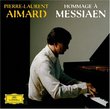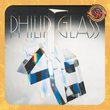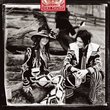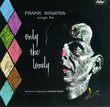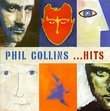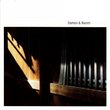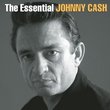| All Artists: Philip Glass, Michael Reisman, Michael Riesman, Philip Glass Ensemble, Iris Hiskey Title: Philip Glass: Einstein on the Beach Members Wishing: 3 Total Copies: 0 Label: Sony Release Date: 10/25/1990 Genres: Dance & Electronic, Classical Styles: Techno, Opera & Classical Vocal, Historical Periods, Modern, 20th, & 21st Century Number of Discs: 4 SwapaCD Credits: 4 UPC: 074643887526 |
Search - Philip Glass, Michael Reisman, Michael Riesman :: Philip Glass: Einstein on the Beach
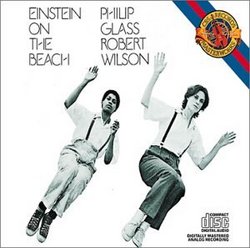 | Philip Glass, Michael Reisman, Michael Riesman Philip Glass: Einstein on the Beach Genres: Dance & Electronic, Classical
Phalanxes of woodwinds, organs, and voices pulse through Philip Glass's most famous opera like nothing so much as a migratory flock engaged in acrobatics overhead. There is no center to the kinetic activity; the down beat ... more » |
Larger Image |
CD DetailsSynopsis
Amazon.com Phalanxes of woodwinds, organs, and voices pulse through Philip Glass's most famous opera like nothing so much as a migratory flock engaged in acrobatics overhead. There is no center to the kinetic activity; the down beat might shift, in split-second hindsight, to the up beat, and the synthesizer might suddenly upstage the libretto of nonsense syllables. The exuberant cacophony of overlapping scripts makes the term "counterpoint" seem inadequate, antiquated. Such was Glass's hope, of course, when on the 200th anniversary of the founding of the U.S. he consolidated influences as diverse as raga, minimalism, and progressive rock to produce one of the few canonical works of late-20th-century opera. The title subject might be taken as a pretext for mathematical reverie, but as much as this is "experimental" music; it is a work of art, not science. The ostensible absence of narrative--despite strong voice-over-like recitatives, written in part by the vocalists--is made up for by the lengthy work's dramatic setting, staged by Robert Wilson, and the intense forward momentum of Glass' composition. --Marc Weidenbaum Similar CDsSimilarly Requested CDs
|
CD ReviewsSharp Mr. A. Pomeroy | Wiltshire, England | 05/19/2000 (5 out of 5 stars) "The original recording, this is shorter, less 'smooth', and punkier than the subsequent re-recording. The cut-down length isn't really noticeable, although you'll be annoyed that it comes on four CDs when it could easily have fitted onto two.Musically there's no real difference between this and the follow-up - the performers here are the original cast, and the organs and so forth are a lot more artificial-sounding, but that adds to the atmosphere. Apart from the truncated ending, it's hard to notice the different lengths, and the performances seem more 'real' and less rehearsed here, although the players have obviously been trained to within inches of their lives.Which one to buy? The sleeve-notes are copious and useful in both cases, the packaging is equally solid (although this is in a hard plastic case, whereas the follow-up is in card), the weights and chemical compositions are roughly equivalent, so it's best to go by price and availability, really." Buy the other Einstein recording new music guy | NY, NY United States | 04/02/2002 (3 out of 5 stars) "The 3 stars here do not reflect my feelings about Einstein on the Beach, an incredible work of art which forever changed the face of Western music. My rating reflects only the quality of this CD. Presumably, if you're reading this, you're shopping for one of the two Einstein on the Beach recordings and trying to pick between the two. This is the vastly INFERIOR disc. The improvement in synthesizer capabilities in the decades between this recording and the later one are notable from the beginning of Disc 1, Track 1. The early organs here have a sort of nasal, anemic sound, as opposed to the warm full sound of the other performance. Recording technology also improved, and the overall result on the other disc is better tone, better clarity. Fulkerson's violin playing is more soulful than Zukovsky's, and his huge sound is far more appropriate in much of the passagework. The other recording provides far greater accuracy and superior tone and clarity throughout in the other instruments as well, in particular the piccolos, and the choir there is simply better. In addition, apparently for time issues, there are disturbing cuts in the piece, particularly the second half of Knee Play 5, the final coda. Finally, the price tag here is substantially more discouraging. If you like Einstein on the Beach, absolutely get a recording. If you are curious about Philip Glass and want a representative sample of his best music, absolutely get a recording. Just get the other one." Einstein as it originally was. Kevin Currie-Knight | Newark, Delaware | 01/06/2003 (3 out of 5 stars) "The consensus seems to be in and that is to go with the Nonesuch recording. This Sony recording was the origninal one, performed when Einstein on the Beach was still "hot from the oven." I agree and disagree with the reviewers below. While the title and concept are the same on these two recordings, they are, virtually speaking, two different operas! If you are a first timer, new to Glass and Wilsons mammoth opera, get the other recording. The musicians are more "fluent in the language," the tempo and feel is smoother throughout and the mix is superior. One problem, the Nonesuch recording, in all its technical ease, is just less exciting. This Sony recording was recorded in the late seventies, when Einstein was new, fresh, and revolutionary. The tempos are generally faster (most noticably in "knee play 3 and and "Building/Train"). Also, I fear that Ashley Pomeroy's review below is misleading. The music IS NOT the same. Quite a bit of reorchestration and rewriting occured between these two recordings. "Building/Train" was originally scored with organ as the main insturment, not violin. Much of the spoken text is different as is Richard Peck's solo in the "Building/Train" scene. The experienced listener will also be able to detect NUMEROUS rewrites (most conspicuous to me was the 9ths and 7ths played by the flute in the "Train" scene giving an otherwise mechanized (and frankly, rather dull) scene a dreamy, cushioned feel. All in all though, the sudden drop-outs of insturments, the lack of a click-track and the annoying four disc (with no track breaks for the "Trial", Trial/Prison" and "Bed" scenes forces me to give this three stars. Still, if you love Einstein like I do, you will want both recordings."
|

 Track Listings (3) - Disc #1
Track Listings (3) - Disc #1